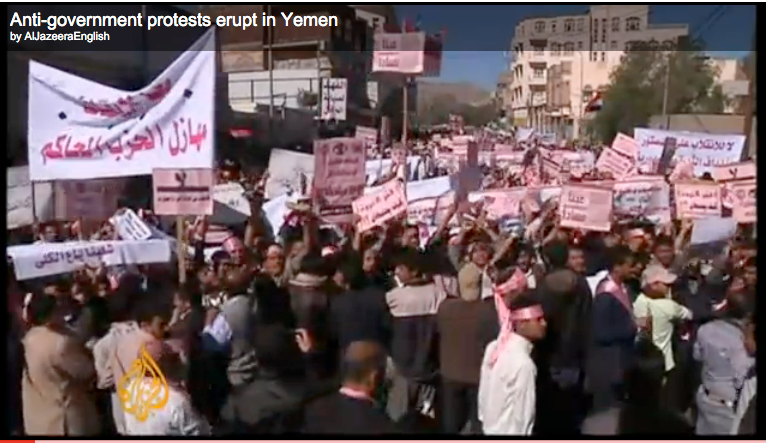
March is Women's History Month, dedicated to remembering how history is our strength, but achievements by women today fighting oppressive governments also show our courage and strength to unite communities and nations.
Yemeni President Ali Abdullah Saleh faces an incredible and some say unlikely opponent: A movement to unseat him led by Tawakkul Karman, who has been fighting for human rights and freedom of expression. Her idols include Rev. Martin Luther King Jr., Mahatma Gandhi and Nelson Mandela.
You might notice a sea of pink color used by the protesters. Colors have been used to signify the escalating stages of protest, commencing with purple and then switching to pink to represent love and peaceful protests.
This is the change that Karman seeks in Yemen, a nonviolent revolution in a country where women are second-class citizens:
Most women here are not free to marry whom they want; many are married off as children. In court, their testimonies are worth half those of men. When women are murdered, their families are compensated at half the amount they would receive for male victims. They are also treated unequally in matters of inheritance. Violence against women is rife, human rights activists say.
A life where there is essentially no representation in government that far from recognizing their human rights, abuses women and girls:
Yemeni parliamentarians (one out of 301 is a woman) still have not agreed on a law to set a minimum age for marriage to prevent girls like Nujood, nine years old at the time of her divorce, from being married before they finish school. Illiteracy among women is still a whopping 67 percent, women are typically the first victims of food shortage (one in three Yemenis suffers from severe malnutrition, according to the United Nations), and many have difficult and limited access to health care. Women’s participation in politics is still minimal and, despite two female ministers, Yemen has consistently ranked bottom in the Global Gender Gap Index since it was first included in the ranking in 2006.
It is the women who have moved past the social restrictions to remain at home away from public life to become the driving force to keep the protests alive.
"Women played and continue to play an integral part in the uprisings and revolutions in the region, and what is key is that they are there, physically present in the streets, showing their numbers," said Nadim Houry, senior researcher at Human Rights Watch.…In T-shirts and jeans or long black robes and veils, tens of thousands of women have made their voices heard in the streets, from Tunis to Cairo, from Manama to Sanaa, to demand reform in a region long ruled by autocracies.